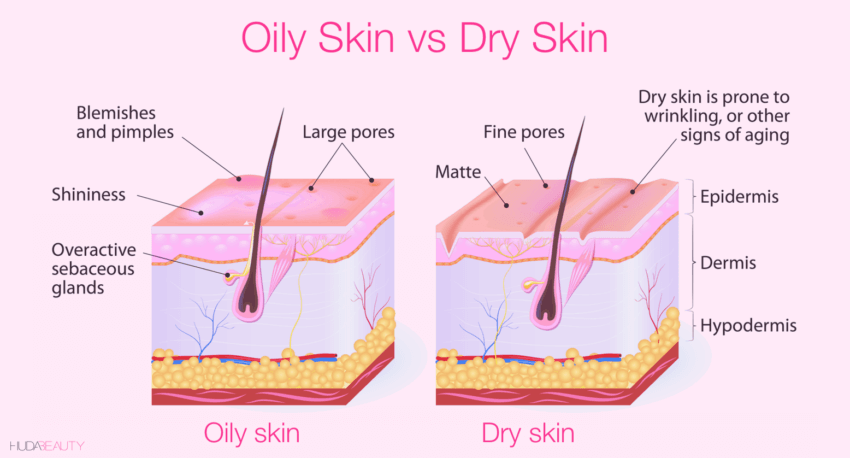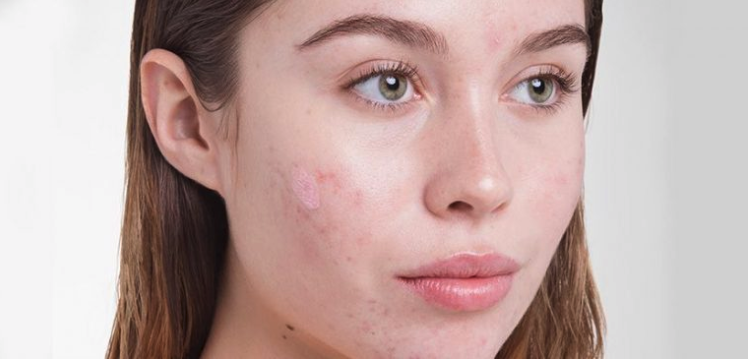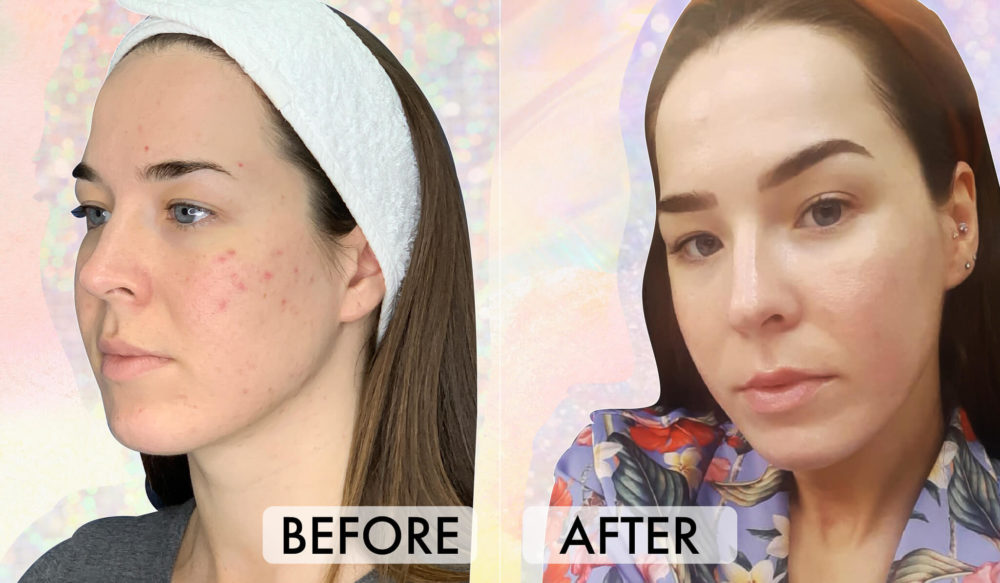Why Your Skin Is Oily And How To Control It
 via Giphy
via Giphy
Battling an oily face can be hella frustrating. All that excess sebum means your makeup doesn’t hold up as long as it should and that you’re constantly having to powder-up or blot. You don’t have to give in to a greasy face, though. Today we’ve been blessed with some skincare angels – AKA kickass dermatologists and estheticians who know exactly what they’re talking about. With their help, we’re outlining the top reasons why your face is so oily and then teaching you how to get it under control.
Oily Skin Cause No 1: Genetics
Here’s the thing – we’re all born with a certain skin type due to genetics. Some of us are more likely to get deep wrinkles, some of us are acne-prone, and some of us battle oily skin. While everyone has pores – or what medical experts refer to as “sebaceous glands” – some of us deal with glands that are naturally just larger and/or more active.

“Sebaceous glands are important because they secrete sebum to lubricate the skin. They form during gestation, shrink after birth, and then enlarge again in puberty,” explains Dr. Tahl Humes, medical director and founder of Vitahl Medical Aesthetics in Chicago and Denver.
It’s more than possible that your genetic draw came with the gift of an oily forehead and ultra-shiny T-zone. While this has some drawbacks, such as a greasy-looking face or clogged pores, the upside is that people with oily skin tend to have fewer wrinkles as they age due to all that moisture.
The Solution: A Good Skincare Regimen to Control Oily Skin
“We cannot change our genetics, but we can use quality skin care products to keep [oily skin] under control,” says Dr. Humes. It’s best to wash your face twice a day with a gentle cleanser – foaming or gel are some of the best products for oily skin types – and then follow up with a mattifying toner and lightweight gel moisturizer to keep skin balanced. Don’t forget SPF, either. Check out our derm-approved routine for oily skin here.
Oily Skin Cause No 2: Hormone Fluctuations
Hormones play a huge role in what our skin looks like, including whether our face is oily or not. Triggers for hormonal unbalance or major hormone changes include puberty (this is why many teens have very oily skin), PMS, pregnancy, birth control, stress, and even certain medications. The hormones at play here are typically estrogen and testosterone.
 via Giphy
via Giphy
The Solution: A Doctor Visit
If you suspect that hormones are the reason why your skin is so oily, our experts recommend meeting up with your doctor so you can pinpoint the exact cause and serve it a cancellation notice.
“For example, [certain] contraceptives and hormone replacement therapy can balance hormones and reduce oiliness and acne,” notes Inna Knyazevych, an esthetician at InGlo Medspa in NYC. There are also certain medications you can take to help address hormone-related oily skin and acne. For example, spironolactone is a very common one prescribed to women in their 20s and 30s, and isotretinoin is commonly prescribed to both teens and adults. A consistent skincare routine in addition to treatments is always helpful. Check out this post on how hormones affect your skin.
Oily Skin Cause No 3: An Aggressive Skincare Regimen
You know how you can sometimes go overboard trying to fix something? Like when you swipe on your winged eyeliner, it’s not quite right, so you go back in again and again? And then suddenly it looks like you’re cosplaying Amy Winehouse? Well, we can do the same thing when it comes to trying to get rid of oily skin.
“Over-exfoliating [and over-washing] the skin can strip the skin of moisture. Your skin then responds by producing excess sebum to lubricate and protect the skin,” says Dr. Humes. It’s a circular issue! The more you scrub and try, the more oil your skin produces in response.
 Via Giphy
Via Giphy
The Solution: Be Kinder to Your Skin
Beating your oily skin into submission just isn’t going to work here. Instead, only wash your face twice a day, though you can even try once nightly to see how your skin responds. Additionally, Knyazevych says to avoid abrasive exfoliators, products that contain alcohol (which can be too drying), and to make sure you’re moisturizing even though you may be tempted to skip that step. (If your skin has moisture, it won’t feel like it needs to produce extra). Also, stick to spot-treating pimples and use mattifying products sparingly.
Posts You'll Love:
Oily Skin Cause No 4: Mild Skin Disorder
If you have a feeling that the above causes aren’t the reason why you have oily skin, it’s possible that you may be dealing with a mild skin ailment.
“People with oily skin can also have seborrheic dermatitis, which is dandruff of the face,” says Dr. Rita Linkner, a board-certified dermatologist at Spring Street Dermatology in New York. “In this condition, an overgrowth of yeast happens on the face and favors areas in the t-zone where sebaceous glands are most numerous, like the eyebrows, around the nose, chin and even chest.”
Signs you have seborrheic dermatitis include patches of greasy skin mixed with scaly or dry-looking bits. You may also experience redness, inflammation, and itchiness.
“Another cause of oily skin is sebaceous hyperplasia, a condition when oil glands dilate and remain in place, leaving yellow bumps that persist,” adds Dr. Linkner. Oily skin is often a common side effect of this skin disorder.
 Source: Shutterstock
Source: Shutterstock
The Solution: Hit Up Your Doc
Suspected skin disorders should be diagnosed by either your general practitioner or a dermatologist. After examining your skin, your physician will determine what you’re dealing with specifically and then recommend the best treatment. For example, if you have seborrheic dermatitis, a topical antifungal cream (max glamour!) will likely be recommended. For sebaceous hyperplasia, Dr. Linkner says there’s a special in-office treatment done that dries out the affected area.
Oily Skin Cause No 5: Your Environment
Have you ever noticed that your skin sometimes changes when the season does, or if you’re traveling somewhere new? It’s reacting to the environment around you, which includes everything from temperature to humidity to what’s in the water.
“When talking about excessive oiliness, it’s also important to understand environmental factors,” says Knyazevych. “[For example], exposure to dry and cold weather has a negative effect on the skin barrier function and can be a cause of increased oiliness. UV rays, blue light, and infrared lights can also have a damaging effect on the skin, causing inflammation that can also lead to oily skin and acne.”
Humidity and warm weather can also be the reason why your skin looks so oily, adds Dr. Humes. In this case, it could just be that you’re dealing with an increase in air-moisture and sweating.
 via Giphy
via Giphy
The Solution: Adjusted Skincare Regimen
In the same way you retire your cardigans and boots and pull out your swimsuits and sandals come summer, it’s important to make adjustments to your skincare regimen when the season changes.
First and foremost, broad-spectrum sunscreen is essential. It’s a must year-round, but you’ll want to pledge your SPF allegiance extra hard by applying it everywhere light touches and by re-applying consistently. This protects your skin from UV damage in addition to preventing sunburns, cancer, and premature aging. A vitamin C serum is also a wise choice and the two should be worn in tandem during the day.
Finally, don’t skip your moisturizer, even if you feel like your oily skin doesn’t need it. In reality, the moisturizer will help hydrate and balance your skin, which causes a decrease in oil production. Stick to a lightweight gel moisturizer if you don’t want to feel bogged down (see our fave moisturizers here). For more seasonal tips, check out our summer and winter skincare guides.
Do you guys have oily skin? Let us know in the comments below.























Leave a comment